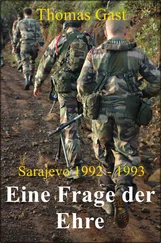Then came fifteen days of shelling so destructive and severe that I was unable to leave the cellar. When I finally surfaced the saxophonist was no longer in evidence. After a while I stopped thinking about him, probably because my ex-girlfriend also left town. I became my number-one priority. In the respite from the shelling, I naturally continued to open my big mouth, to discuss the rights and wrongs of the situation in a thundering voice, inviting others to follow my example. I began to yell a lot, my soul full of fear, and wondered it somebody up there — not the gods, you understand, but the Chetniks manning the big guns — were listening to my ramblings. If so, would they get so fed up with me one day that they would just take aim and shoot me down in mid-sentence?
As soon as the fear became unbearable and there was nobody left to listen to my tirades, I decided to escape. I wanted to disappear from a city that no longer resembled the place in which I had seduced my ex-girlfriend in the Belgrade taverna. I went abroad with a thousand excuses on my lips an many other explanations in my head. I arrived in a quiet, peaceful country populated by other women and their jazz-playing boyfriends, in order to begin the story all over again.
Some time later I obtained a copy of a newspaper from Sarajevo and discovered on the back page that the saxophonist had been killed while defending the city. It’s not surprising that he died: being tall and having soft fingers, he wasn’t made to hold a gun. I, who convinced everybody of my importance, have a fat, ugly and crooked index finger just like in an advertisement for machine-guns. But I knew how to talk, and the sax player didn’t. Nothing can help him now. He lost two battles: one for the female heart and the other for his life. It is clear now that he was always the superior individual, with nobler feelings, stronger and braver. He just couldn’t put it into words.
Saxophonists don’t make history — they make music. But perhaps, after so much talk and fighting, unspoken words do create a silence in whose gentleness the survivors of good and bad can sleep easy.
Three: Who will be the Witness?
You hear the whistle over your head. It’s followed by the odd moment of suspense, and then below, somewhere in the city, there’s an explosion. You can always see the spot clearly from your window. At first there’s a tall, thin column of dust which turns to smoke and flames. You wait a few minutes to work out what sort of building it is. If the fire is slow and lazy, it means that the burning flat belongs to some poor people. If it bursts into a huge, blue fireball, then it’s somebody’s nicely decorated attic with panelled walls burning. If it burns unremittingly, then the flames must be coming from the apartment of a wealthy shop-owner, full of massive antique furniture. But if the flame suddenly shoots up, wild and uncontrollable, like the hair of Farrah Fawcett, and disappears even more rapidly, allowing the wind to spread paper ash over the city, that means somebody’s private library has just burned down. As you witnessed many such vigorous fires over the months and years of shelling, you got to feel that the foundations of Sarajevo must have been made out of books. And even if they weren’t, you’d like to say, as you stroke the bound volumes on your shelves, that the city still contains many books that have not yet been destroyed.
In any private library most of the books have not been read. No doubt you bought this one or that one because of its cover or the author’s name, or simply because the smell of the paper appealed to you. You pick up such a book often in the early days, open it, read a few lines and then put it back. After a while you forget about the book, or else you look at it from a distance with mild disgust. You have often wanted to take it to the nearest public library and give it to somebody, just to get rid of the thing in some way, but you were never able to do so. It will always remind you of your tendency to hoard useless things, and will soon transform itself, in a painful burning moment, into a host of other memories. All those unnecessary and unread books will prove to be a burden when it’s time to leave them behind. You may almost come to understand the fire’s rapture as it engulfs similar books around the city.
There are a few books which you have not opened since childhood. They remind you of a time when you still hadn’t learned to scan the pages, to read from the top left-hand corner to the bottom right. These are probably the only books you have really enjoyed in your life. All the best children’s stories had an unhappy ending which didn’t teach you anything, except that sadness is a place where fiction becomes more important than reality. In John Huston’s film The Dead, a woman bursts into tears and is unable to say why. As you watched the film, you thought that this was in fact the way life is — and you too felt like crying.
There are even fewer books that you imagined you’d always carry with you. When you read one for the first time, you’d try and postpone the ending. Later on, you found them exciting in both content and appearance. But you will have to leave them behind, just like all the others, with the bitter conviction that not only in this city, but also in the world at large, a book’s natural state of aggregation is fire, smoke and ash. Somebody in the future may find this pathetic, but for you, especially when you end up in other cities where bookshops still exist, Farrah Fawcett’s flaming hair will always be the plain truth. The only thing that burns better, more beautifully and more thoroughly than a book is a manuscript.
With the illusion of a private library also vanishes the illusion of a bibliotheca, or civilization of books. Its very name, which is just a Greek word, like any other, but which is, for you, tied to the name of the Holy Scriptures, was enough to make you a believer. But, as they burned, disappearing irrevocably one after the other, you stopped believing that there was any purpose in a book’s existence. Or perhaps the only one to have worked out their purpose was the Sarajevan author and bibliophile who, instead of using expensive firewood, warmed his fingers last winter on the flames of Dostoevsky, Tolstoy, Shakespeare, Cervantes. . As a result of so many deliberate and accidental fires, a new kind of person has been created, a person who has come bitterly to understand how things go and who, as a result, would coolly watch flames rising from the Louvre and not even reach out for a glass of water. There’s no point in not letting a fire swallow up things that human indifference has already destroyed. The beauty of Paris or London is only an alibi for the criminals who have allowed Warsaw, Dresden, Vukovar and Sarajevo to disappear. But even if they hadn’t ceased to exist, they would have become places inhabited by people who even in peacetime were ready to evacuate, who were prepared to abandon their books.
In this world, as it is, there is one basic rule; Zuko Džumhur mentioned it when he was thinking about Bosnia, and it relates to the two suitcases that you always have packed in the hall. All your possessions and all your memories have to fit into them. Everything outside is already lost. There is no point in looking for reasons or meanings or excuses. They are just a burden, like memories. There is nothing left but to return the books you have borrowed in the past, trying to avoid or overlook the ones you were given as presents, and the others you’ve made a note about to send to friends who live elsewhere, so that those books would not be engulfed in flames — or, at any rate, not until the day the world returns to the condition it was a few million years ago.
Читать дальше










